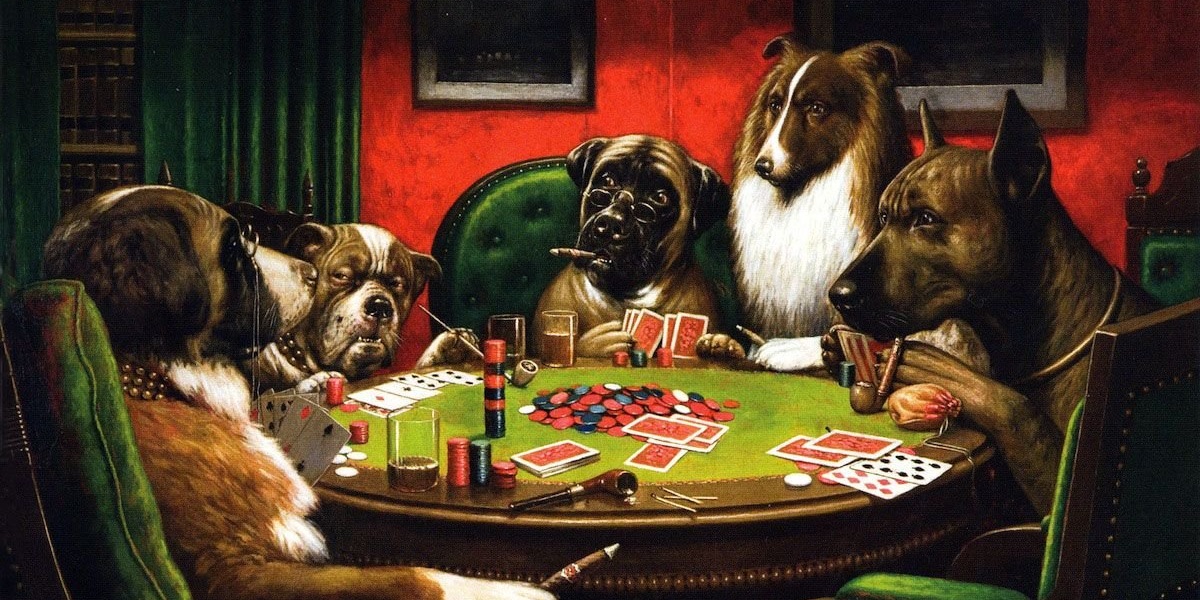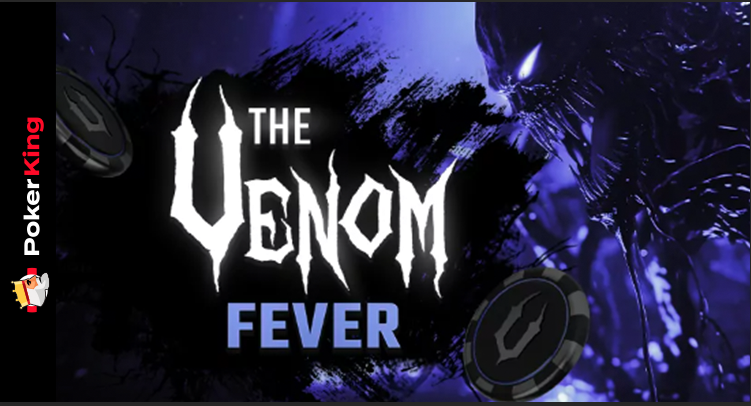

Poker in art and culture: the famous painting of dogs playing poker

Popular culture is riddled with references to poker and, if we stop to take a look at the role that poker has played in the various formats of culture and entertainment over the years, we can see how important it has been and how recurrent it is to represent, in one way or another, a poker game on a canvas, a photograph or a film recording.
The impact of Coolidge's
series on popular culture
Poker has provided the context for some of the
best literary and cinematic stories of the last century and a half. Authors
such as Ian Fleming have used poker to tell their stories (the creator of
James Bond initiated the famous English spy James Bond in a frenetic poker game
in the novel Casino Royale), and in the cinema countless westerns have
been set in wastelands where there were always poker games and where some of the
characters in the story usually faced each other.
However, if there is one reference known
worldwide in which poker plays a leading role, it is undoubtedly the famous
painting of the dogs playing poker. In fact, it is a series of paintings in
which dogs are the protagonists and are represented in multiple scenes
playing on a poker table.
A fragment of this painting can be seen in the
second film adaptation of The Secret of Thomas Crown, when a Monet is forged
over another copy of the famous painting by Cassius Marcellus Coolidge, to whom
the 18 works showing dogs in different attitudes are attributed. Of these 18
compositions, in half of them the dogs are playing poker. In fact,
artistically they are highly appreciated for the extreme humanization of the
characters, as they are dogs with totally human reactions and attitudes.
Cassius Marcellus Coolidge was a New York artist who came a long way to devote himself to painting. In fact, his career was plagued by ups and downs and insecurities that, nevertheless, did not prevent him from creating some of the most amazing compositions in the world of modern art. The famous painting of dogs playing poker is a good testament to his character and his eagerness to make his way in the art world, and his work has been appreciated over time to be considered one of the great contributions to the art of his time.
The potent symbolism of
dogs playing poker
Cassius Coolidge, known vulgarly as
"Cash," painted the series around 1894 with one idea in mind: to represent
the tastes of late 19th century American society. Bearing in mind that
poker deeply touched the author, it is understandable that he used this game as
a leitmotif for his representations.
When he arrived in North America, it is known
that Coolidge was fascinated by poker, a game that was beginning to be
considered little less than a religion. The number of players was increasing
and Texas Hold'em began to attract hundreds of new fans. A modality that,
it must be said, is not the one represented in Cassius' pictorial series.
It is known that these compositions were mainly intended to accompany some advertising campaigns of the time, hence the interest in representing various collective interests as a society in a faithful but stylistically different way, playing with that surprise factor. Taking into account the importance that this game was acquiring in American society, the idea of representing dogs playing poker in half of the compositions of the series began to make sense.
The complete pictorial
series by Cassius Marcellus Coolidge
The famous painting of dogs playing poker is
only one of multiple depictions Coolidge made for the entire series. Two of
the most famous paintings in the series were auctioned in 2005 for much more
than the estimated value: from the initial estimate of $50,000, they went
to a final sale price of almost $600,000. We are talking about "A Bold
Bluff" and "Waterloo", two of the most famous compositions and
which had reached the highest value before the auction.
Although these two parts shared space,
with the famous red room next to a green curtain that seemed to hide a small
library, "Breach of Promise Suit" broke completely with this context
and showed several dogs in what looks like a dispute during an oath. With
"A Friend in Need" they went back to the origins, as well as with
"His Station and Four Aces", other compositions that accompanied the
original painting of dogs playing poker.
The collection was complemented by
"Pinched with Four Aces," "Poker Sympathy," "Post
Mortem," "Sitting Up with a Stick Friend," "The
Reunion," "Stranger in Camp," "Ten Miles to a Garage,"
"A Bachelor's Dog," "One to Tie, Two to Win," "Riding
the Goat" and "New Year's Eve in Dog Ville."
Some of these representations have been
captured in multiple television formats that have become iconic among new
generations. For example, a famous painting of dogs playing poker can be
seen represented in an episode of The Simpsons: poker is not a recurring
theme in the series, but it does make use of small moments of humor disconnected
from the main line that serve as an escape for the viewer, one of the keys to
the success of the format of Matt Groening's series.
In other cartoon series, inspiration has also
been found in this composition, although less explicitly. In the painting
itself, imitations or references to Coolidge's work can also be found,
elaborated with a more accentuated note of humor. And the fact is that the
famous painting of the dogs playing poker, which today is a pop icon in the
culture of the United States, continues to serve as inspiration for various
newly created formats, and even derives imitations of references such as those
used by The Simpsons in the poker that, for example, the family dogs are
playing with other animals in the neighborhood at the kitchen table of Marge
and Homer.
You may also like

Poker Night at the Inventory: what it is and game tips and tricks
The extinct and later resurrected Telltale, responsible for some of the best adventure games of the last decade, was responsible for developing and maintaining this poker game at the beginning of t...

Jon Ander Vallinas Wins the Super Monday, Taking Home Over $100,000
Jon Ander Vallinas Wins the Super Monday, Taking Home Over $100,000A High-Stakes Victory for Jon Ander VallinasOnline poker continues to produce exciting success stories, and this time, the spotlig...

Odds in poker: fundamental aspects to calculate them
Poker is a game of skill rather than chance. That is something you learn quickly and it is the first fact that makes any novice realize that poker is surrounded by myths. The odds in poker are elem...













